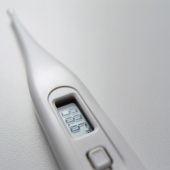- 8 Ways to Increase Dopamine Naturally
- 7 Best Breads for Maintaining Stable Blood Sugar
- Gelatin vs. Collagen: Which is Best for Skin, Nails, and Joints?
- The Long-Term Effects of Daily Turmeric Supplements on Liver Health
- Could Your Grocery Store Meat Be Causing Recurring UTIs?
- Are You Making This Expensive Thermostat Error This Winter?
- Recognizing the Signs of Hypothyroidism
- 10 Strategies to Overcome Insomnia
- Could Artificial Sweeteners Be Aging the Brain Faster?
- Techniques for Soothing Your Nervous System
Fever-Related Seizures in Kids Eased by Epilepsy Drug: Study


Early treatment with antiepileptic drugs reduces the length of fever-related seizures in children, according to a new study.
Published Feb. 6 in the journal Epilepsia, the study also found that a standard emergency medical services treatment guideline for prolonged fever-related seizures is needed in the United States.
Most fever-related seizures, also called febrile seizures, are brief, but up to 10 percent can last more than 30 minutes. These prolonged seizures can put children at risk for short- and long-term complications, including developing epilepsy, according to a journal news release.
The new study included nearly 200 children, aged 1 month to 6 years, who had one seizure or a group of seizures that lasted more than 30 minutes. The researchers examined the connection between time to treatment and length of the seizure.
About 90 percent of the children were given at least one antiepileptic drug, and the first dose was given by EMS crews or emergency-room staff an average of 30 minutes after the seizure began, the study found.
The average length of seizure was 81 minutes among children who received an antiepileptic drug before they arrived at the emergency room and 95 minutes for those who did not. On average, seizures ended about 38 minutes after a child received the first dose of an antiepileptic drug.
“The time from the start of the seizure to treatment is crucial to improving patient outcomes,” study lead author Dr. Syndi Seinfeld, an assistant professor in the division of child neurology at Children’s Hospital of Richmond, at Virginia Commonwealth University, said in the news release.
“Our study is the first to examine the treatment of [febrile seizures] by EMS, which currently does not have a standard therapy protocol for prolonged seizures,” Seinfeld said.
“Our findings clearly show that early [antiepileptic drug] initiation results in shorter seizure duration,” she said. “A standard [prolonged seizure] treatment protocol prior to arrival at the hospital, along with training for EMS staff, is needed across the United States to help improve outcomes for children with prolonged seizures.”
More information
The U.S. National Institute of Neurological Disorders and Stroke has more about febrile seizures.
Source: HealthDay
Copyright © 2026 HealthDay. All rights reserved.










